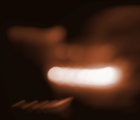
Be Open: Panzerfaust and the Abyss
"[W]hen you look into the abyss, the abyss also looks into you. " - Friedrich Nietzsche
All dark creatives share one important characteristic: they do not look away. They are compelled to stare into the abyss and acknowledge darkness, no matter the cost. Says Kaiser, lead guitarist and lyricist of Panzerfaust, “To be happy all the time is to not be human.” Arguably, the principal rite of passage for dark creatives is to bring to light that which can only be found in darkness, but the ultimate goal of the artist is not necessarily to lead others, but to find a new way forward for themselves. “Vestigia…nulla retrorsum” (“no turning back”) reads the motto that appends their biography. Kaiser says it is the band’s directive to “step out on the edge, without fear, and embrace the death drive, or Thanatos,” which is loosely defined as the primal, self-destructive urge that challenges the instinct for self-preservation.
EPHPHATHA:
“And looking up to Heaven, he sighed and said unto him, ‘Ephphatha, be opened’” - Mark 7:35
“I wouldn’t say that we’re spiritual people in the conventional sense,” reflects Kaiser, “however, if there’s anything that would come close to being a spiritual experience it would be that when we do go on stage and we perform our music together…it’s something that is transcending.” He says he has reservations about using the word “ritual” to describe their highly intuitive, collaborative approach to songwriting and the ceremonial live performances, replete with incense and candelabra. Goliath (vocals) rejoinders, “I look at it more as a meditation.” One can see why, when they take the stage with singular focus – until the candles are lit, censer swung, and the first chord sounded, the audience is completely ignored.
“It is a meditative experience,” grants Kaiser, “although by no means calming, and by no means are we trying to aim for that. It should be confronting and thought-provoking.” He says the act of playing live serves as a self-contained conduit to their creative source – “that’s our Void,” he says. “Everything else essentially is negated, from our minds and from our view, and everything we do onstage holds a purpose and a meaning. We don’t just go onstage to play a show and get off, every night it’s one of these things where everybody goes into that void and separates from reality, it’s kind of 45 minutes of euphoria.”
On their latest full-length album, Jehovah-Jireh: The Divine Anti-Logos, the word “ephphatha” is employed as the title of the second song. The state of openness it prescribes, in opposition to the dictates of reason, is an intuitive one; the biblical tale in which the word appears is one of a miraculous awakening effected by Christ upon a deaf man and the story demonstrates the potential for initiation/enlightenment through direct experience. Disregarding the confining ideologies that ensued from black metal’s popularization, Panzerfaust observe the genre’s core principles of antitheism and individualism. “Contrary to popular belief, black metal is not one of these genres restricted or confined to any kind of bracket,” says Kaiser. “As a band we’re free-thinking, we don’t have those barriers or restrictions in place to keep us from exploring any idea we see fit.”
Their approach to songwriting is similarly visceral. Musically, says Kaiser, they maintain a healthy respect for immediacy as a guiding principle. “We’ve never written anything down, never used a whiteboard…most of the time it comes naturally, it just explodes and syncs up together.” Goliath adds, “That’s actually one of the best dynamics about this band – with all the members, when it comes to writing, there’s never, ‘You have to jot this down,’ or, ‘Let’s go back to this riff’ – it’s an open jam.” He says the song “Bythos – Proarkhe” is a prime example: “That song was recorded in one take, it was the first time we’d ever played it together as a band. We literally hit record, and just saw what happened.” Kaiser recalls, “I had a lyrical idea for it, so I had an idea of where it was going, however the music – we just started to play and it just came, and that was it. We didn’t go back and do a second, third time, that first time – that was it.”
Echoing the prophetic tone of texts like the Bible or Nietzsche’s Thus Spoke Zarathustra, the lyrics on Jehovah-Jireh are of particular significance to Kaiser. “I came to this revelation that lyrics should be just as important as the music,” even if, as is often the case with extreme music, vocal delivery renders them undecipherable. “That doesn’t mean you can half-ass it, you can’t be artificial on that front…I have no respect for people who just put a bunch of words together, thinking something sounds poetic.” He says the emotional qualities of the music dictate the fundamental meaning of a song, which is “like writing a book; you can’t just keep writing the same book over and over again.” The lyricist’s goal, says Kaiser, is to articulate the meaning inherent to the music in a way that “does justice” to the ideas and feelings one takes from it.
Everything tires with time, and starts to seek some opposition, to save it from itself. - Clive Barker, “The Hellbound Heart”
Recently the band gave up their corpsepaint – Kaiser calls it black metal’s “traditional garb” – in favour of cemetery dirt, which they smear on their faces, arms, and clothes; and the sackcloth hood worn by Goliath, cinched by a coarse noose around his neck. Kaiser notes that the dirt, which is taken from the location of the band’s inception, has personal significance for all members; Goliath says it connects them to their roots. The visual reinvention contributed a new, transformative element to their onstage experience. “Once I put that mask on and I go onstage,” observes Goliath, “I’m not the same person. It’s not something I force myself to do, it’s not something I try to do, it just naturally happens. For me it’s honestly been the biggest gift, it’s given me more room to work with stuff, to let myself go.” They agree the mask creates more of a disconnect for the audience than the discarded corpsepaint, but Goliath says that wearing the mask presents him with fresh challenges and insights. In his capacity as frontman, “Some nights I can’t read people at all…Sometimes I feed off that, whether it’s a positive vibe, a negative vibe, or a neutral vibe that I have no idea what’s going on. I just feed off of it, and sometimes it makes me perform much better.” Their approach to performance, says Kaiser, is “always ever-expanding, and ever-changing. It’s never an emulation of the night before, it’s always something that takes a different form naturally, every single night. I think that’s why it’s always refreshing – because we don’t have a template or a plan for what we’re doing. We go up there and a lot of it just happens…It’s working off of feeling rather than script.”
Their fervent embrace of instinct and impulse as guiding principles for songwriting and performance reflects a deep respect for the more numinous aspects of creativity, and maintains a connection to the inspirational source that cultivates their creative process. Not content to follow in the footsteps of established or acclaimed black metal bands, Panzerfaust demonstrates that new paths are blazed not through emulation, but by committed, self-determined exploration.
Ephphatha, indeed.
* * * Posted: Sep 25, 2014 Originally Published: Sep 23, 2014
Featured Article
Newest Profiles

West Coast REACH Association

Thursday Night Jam at The Loft










